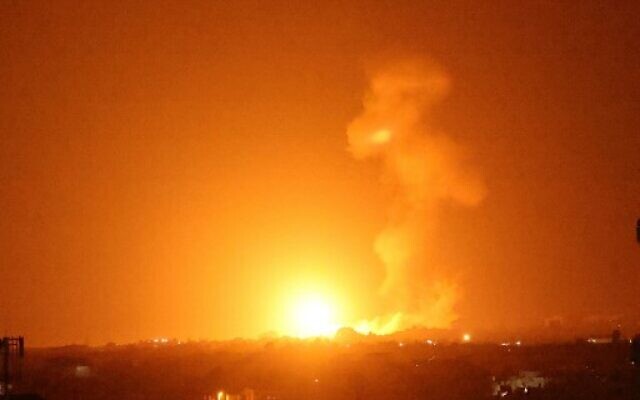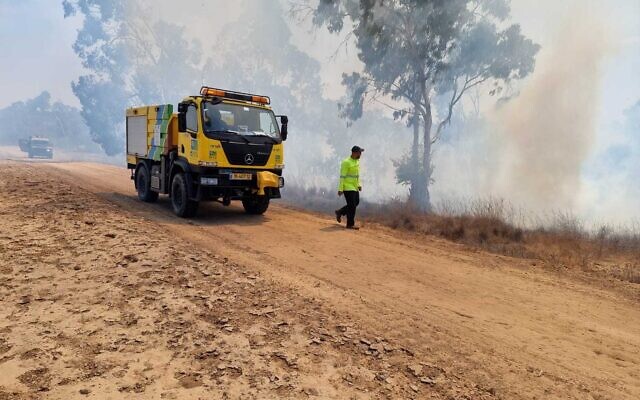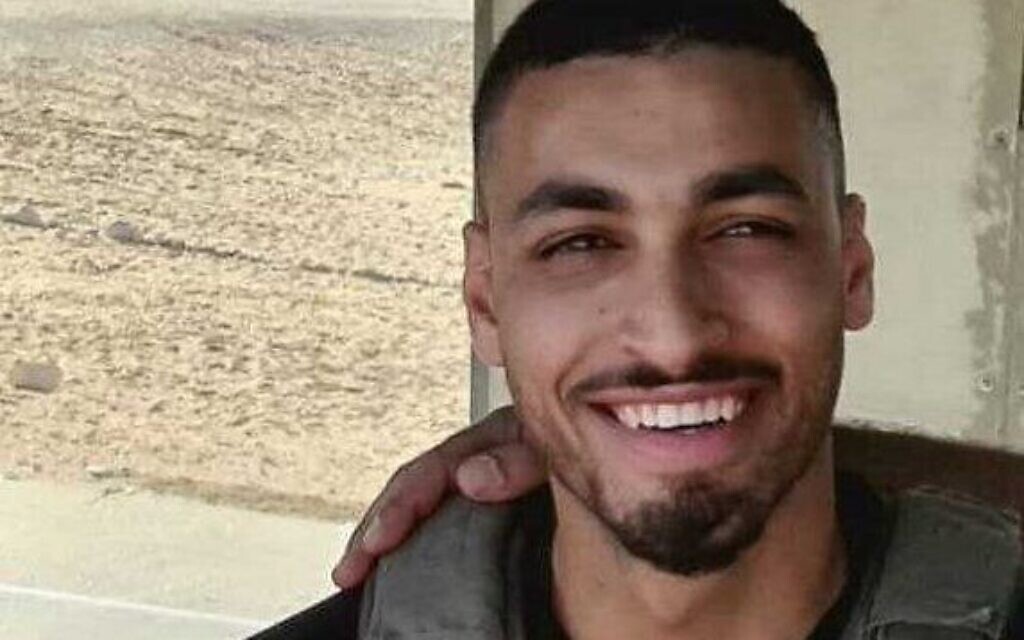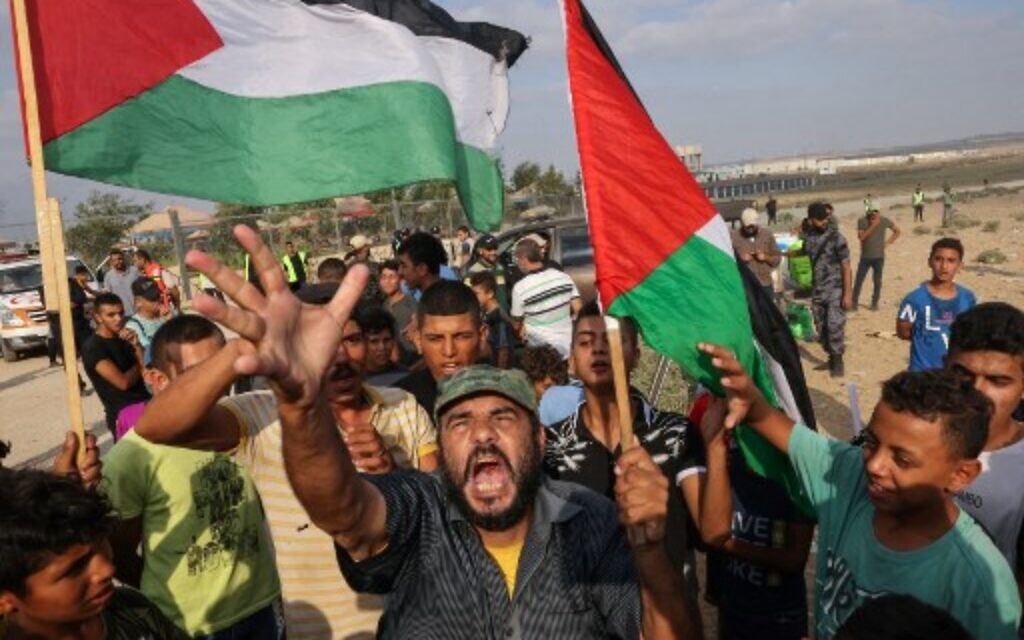Israel hits Hamas weapons factory, tunnel entrance and underground rocket launcher next to a school; raids after incendiary devices from enclave ignite blazes in southern Israel

The Israel Defense Forces carried out airstrikes in the Gaza Strip late Monday night in response to the launching of arson balloons from the coastal enclave that set off at least nine fires in Israeli border communities earlier in the day, the army said.
The army said it hit a Hamas weapons factory in the southern town of Khan Younis, the entrance to a terror tunnel in Jabaliya and an underground rocket launcher.
The army said the launcher was located in a heavily populated area near a school in the Shejaiya neighborhood.
There were no casualties in the raids, but they did cause material damage, a Palestinian security source told AFP, speaking on condition of anonymity.
He added that Hamas fighters had fired on the Israeli aircraft. Last week machine gun fire aimed at Israeli jets hit homes in the Israeli community of Sderot, causing some damage.
The army later said it attacked an additional tunnel entrance after the planes came under fire.
Senior Hamas official Ismail Radwan condemned the Monday night strikes, vowing that Hamas would not be deterred. “The bombing will only increase our determination to reclaim our rights,” he said.
The arson attacks earlier Monday drew harsh criticism from local government officials, who called on the government to take action.

Earlier Monday evening, Channel 12 reported that the Israeli security establishment believes that Israel and Hamas are again headed toward full-on fighting in Gaza.
An official told the networks that Hamas is seeking to increase pressure on Israel by renewing both Gaza border protests and the launching of arson balloons from the coastal enclave.
With the renewal of border protests, Israel will be forced to respond more strongly to distance Gazans from the security fence, with the likely result being more casualties to the Palestinian side, to which Hamas will want to respond. The security official, who spoke on condition of anonymity, therefore surmised that another war between Israel and Gaza terror groups may be inevitable.
However, Israel is trying to tread lightly, ahead of Prime Minister Naftali Bennett’s meetings with US President Joe Biden in the White House on Thursday, and next week with Egyptian President Abdel-Fattah el-Sissi, Channel 12 reported, while clarifying that Israel will still respond to aggression from Gaza.
Footage of one of the IDF strikes in Khan Younis, southern Gaza this evening. pic.twitter.com/CQgCtZtaGj
— Emanuel (Mannie) Fabian (@manniefabian) August 23, 2021
Recent days have seen a major rise in tensions along the Gaza border, with the potential for renewed clashes between Israel and terror groups in the Strip following May’s 11-day conflict, known in Israel as Operation Guardian of the Walls. This has largely been driven by demands from Hamas and other terror groups in Gaza that Israel allow additional funds and goods into the beleaguered enclave. Jerusalem has refused, unless Hamas releases two Israeli civilians and the remains of two soldiers from captivity.
There appeared to be a breakthrough in the stalled indirect negotiations between Israel and Hamas last week, when Qatar and the United Nations announced that they had created a new mechanism for moving aid into the Gaza Strip that Defense Minister Benny Gantz said would prevent the money from reaching Hamas.
On Monday, however, Palestinian terror groups announced plans to continue holding demonstrations along the border, including one on Wednesday.
According to schedules published by Hamas-aligned media, buses will transport demonstrators from across southern Gaza to participate in the rally. The event has been dubbed by its organizers “The Sword of Jerusalem Shall Not be Sheathed,” a reference to Hamas’s name for the May battle between Gaza and Israel.
On Saturday, Hamas organized a similar large demonstration on the Gaza border that turned particularly violent at one point, with hundreds of rioters storming the security fence. A Palestinian man with a pistol opened fire at an Israeli Border Police sniper, Barel Hadaria Shmueli, who was stationed on the border, shooting him in the head and critically wounding him.
Forty-one Palestinians were also injured during Saturday’s clashes, two of them critically, by Israeli gunfire and riot dispersal weapons, according to Hamas’s Gaza health ministry.

In response to the shooting attack on the border guard, the IDF conducted limited airstrikes on Hamas weapons storage sites in what was widely seen as an effort to retaliate to the attack on the soldier without risking a larger conflict with the terror group.

For months, Israel and Hamas have held indirect negotiations to set the terms for a new status quo. In the aftermath of May’s fighting, Israel has maintained heightened restrictions on Gaza, significantly limiting imports and exports and complicating the reconstruction of the battered enclave.
Prior to the conflict in May between Israel and Gaza’s Hamas rulers, the flow of funds from Qatar was considered vital to maintaining relative calm between the Jewish state and the Islamist terrorists.
Under the new arrangement announced on Thursday, Qatar and the UN will channel $100 benefits for 100,000 impoverished Gazan families — $10 million in total — each month through the UN and the UN World Food Program, Qatari envoy to Gaza Mohammad al-Emadi said in a statement.
Israel has fought four large campaigns against terror groups in the Strip since Hamas took control of the area in 2007, along with dozens of smaller exchanges of fire.
Earlier this month, Palestinian terrorists fired two rockets at southern Israel in the first such attack since the May conflict.
As reported by The Times of Israel
